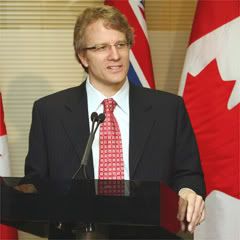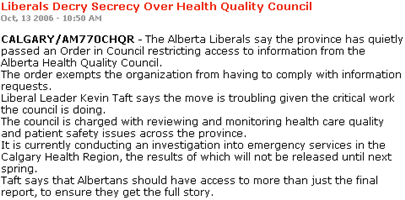Anyone familiar with the Liberal Party of Canada is certainly familiar with its obsessive impulse to take over the public policy functions of the provinces in areas of provincial jurisdiction. The most obvious example of this is the Canada Health Act, but the Liberal desire for total domination of the provinces extends far beyond healthcare. They have their beady little eyes set on education as well.
Don't believe me?
 Take a look at one Gerard Kennedy, the "new generation" of Liberal. He started off in the Liberal leadership race with great fanfare, but, unfortunately, he has appeared a bit stale as of late, and is rarely mentioned as a frontrunner anymore. He has obviously decided that he needs a new schtick, and what better way to endear himself to fellow Liberals than to promise to do to education what Pierre Trudeau did to healthcare. Young Gerard may be a college dropout, but he ain't no dummy. He knows that nothing titillates a Liberal more than grandiose talk about national standards and new federal roles:
Take a look at one Gerard Kennedy, the "new generation" of Liberal. He started off in the Liberal leadership race with great fanfare, but, unfortunately, he has appeared a bit stale as of late, and is rarely mentioned as a frontrunner anymore. He has obviously decided that he needs a new schtick, and what better way to endear himself to fellow Liberals than to promise to do to education what Pierre Trudeau did to healthcare. Young Gerard may be a college dropout, but he ain't no dummy. He knows that nothing titillates a Liberal more than grandiose talk about national standards and new federal roles:
Kennedy calls for national education standards
Elizabeth Thompson
CanWest News Service; Montreal Gazette
Wednesday, August 30, 2006
Canada should adopt national standards in areas such as education if it wants to compete in an era of globalization, says Liberal leadership hopeful Gerard Kennedy.
"A federal government can be much more effective if it takes the leadership role and I think that is what has been missing," said Kennedy, who stepped down as Ontario's education minister to seek the leadership of the federal Liberal party.
"We need to declare what our goals are, the provincial governments need to be brought along as partners ... These are the jurisdictions of the provincial governments but they too should meet standards, just like the federal government should. In the absence of that we will be unable to compete in the global economy."
Kennedy says those national education standards should be accompanied by federal cash and the provinces should work together to set them.
''If you look at the equalization premise in the Constitution it is about comparable standards. We don't even know if we have comparable standards. What we have is comparable funding, but what we don't have is the result. And that is going to hold us back.''
While he wants to see Ottawa play a leadership role in developing national standards for education, he says it would be a mistake to have a homogenous curriculum across the country.
Under the Canadian Constitution, education falls largely under provincial jurisdiction and provinces have jealously guarded their right to decide what is taught in their schools and which standards should apply.
However, the way Ottawa and the provinces relate to each other over their respective jurisdictions is just one of the things Canada should approach differently as it moves into the 21st century, says Kennedy.
Ever since he jumped into the crowded leadership race in April, Kennedy has sought to set himself apart as a candidate for a new generation and for a new century.
With less than two weeks to go before the next general Liberal leadership debate this time in Quebec City on Sept. 10 Kennedy is also working hard to show Quebecers that a guy raised in the West and who served in Ontario Liberal Premier Dalton McGuinty's cabinet can understand Quebec and deal with its concerns.
Kennedy, who was criticized in the spring by some Liberals for lack of fluency in French, has spent much of the summer in Quebec.
Along the way, he says, he learned a lot about the province.
''I think I got a sense of diversity in Quebec which was really important ... I also got a bit of a sense, that I'm still sort of assimilating, about the whole relationship between Quebec and Canada and Quebec in its own past.''
And when it comes to how to approach Quebec, Kennedy rejects a tough federalist line as well as a more decentralized view of federal-provincial relations.
''I'm in favour of the third way which is basically to come up with a purpose that appeals equally to Quebecers and to the rest of the country.''
Wow! How fortunate. Just when Gerard needed an issue, along comes a crisis in education. Some people have all the luck.
I'm sure the parallel between Gerard's approach to saving us from provincial standards in education, and the Liberal approach to saving us from provincial standards in healthcare, is also a pure coincidence.
Let's review the essential elements of Gerard's approach:
- manufacture a problem regarding provincial standards (in this case, provincial diversity would appear to be the problem);
- use the fear factor to hype the problem to the brain dead supporters of the Liberal Party (Kennedy makes the unsupported claim that Canada risks falling behind in the "era of globalization");
- propose federal government input and control as a solution (without explaining what it would do that the provinces are incapable of doing);
- offer federal funds to bribe the provinces (the feds can always withdraw them after they have achieved full political control of education - just like they did in healthcare); and
- exempt Quebec from the scheme (some provinces are more equal than others, and Quebec can be cranky when it comes to federal domination).
The fact that Alberta students are already amongst the highest achievers in the world on standardized tests (and perform far better than all other Canadian provinces) doesn't even warrant a mention. To admit that would be anathema to a Liberal. Provincial governance is something that Albertans must be protected from. Albertans governing themselves in an area such as education is a problem, because Gerard Kennedy says it is, and, by golly, the only way to fix it is reduce the role of Albertans in their own public affairs and increase the role of Ottawa Liberals.
So, there you have it. Canadian imperialism in action. Beautiful in its simplicity, isn't it?
It will be interesting to see if anything appears in the media in the next few days from the Alberta Liberal Party regarding this plan. After all, they keep insisting they are fit to govern the province of Alberta, if only the voters would give them a chance.
Here is Kevin Taft's chance to show some leadership on an important issue.
I'll keep my eyes and ears open Kevin, but, let's face it, since both you and your colleagues in the Alberta Liberal Party essentially agree with this agenda, you aren't going to challenge it.
It's just not in your character.
Source: The Montreal Gazette








 Take a look at one Gerard Kennedy, the "new generation" of Liberal. He started off in the Liberal leadership race with great fanfare, but, unfortunately, he has appeared a bit stale as of late, and is rarely mentioned as a frontrunner anymore. He has obviously decided that he needs a new schtick, and what better way to endear himself to fellow Liberals than to promise to do to education what Pierre Trudeau did to healthcare. Young Gerard may be a college dropout, but he ain't no dummy. He knows that nothing titillates a Liberal more than grandiose talk about national standards and new federal roles:
Take a look at one Gerard Kennedy, the "new generation" of Liberal. He started off in the Liberal leadership race with great fanfare, but, unfortunately, he has appeared a bit stale as of late, and is rarely mentioned as a frontrunner anymore. He has obviously decided that he needs a new schtick, and what better way to endear himself to fellow Liberals than to promise to do to education what Pierre Trudeau did to healthcare. Young Gerard may be a college dropout, but he ain't no dummy. He knows that nothing titillates a Liberal more than grandiose talk about national standards and new federal roles:


